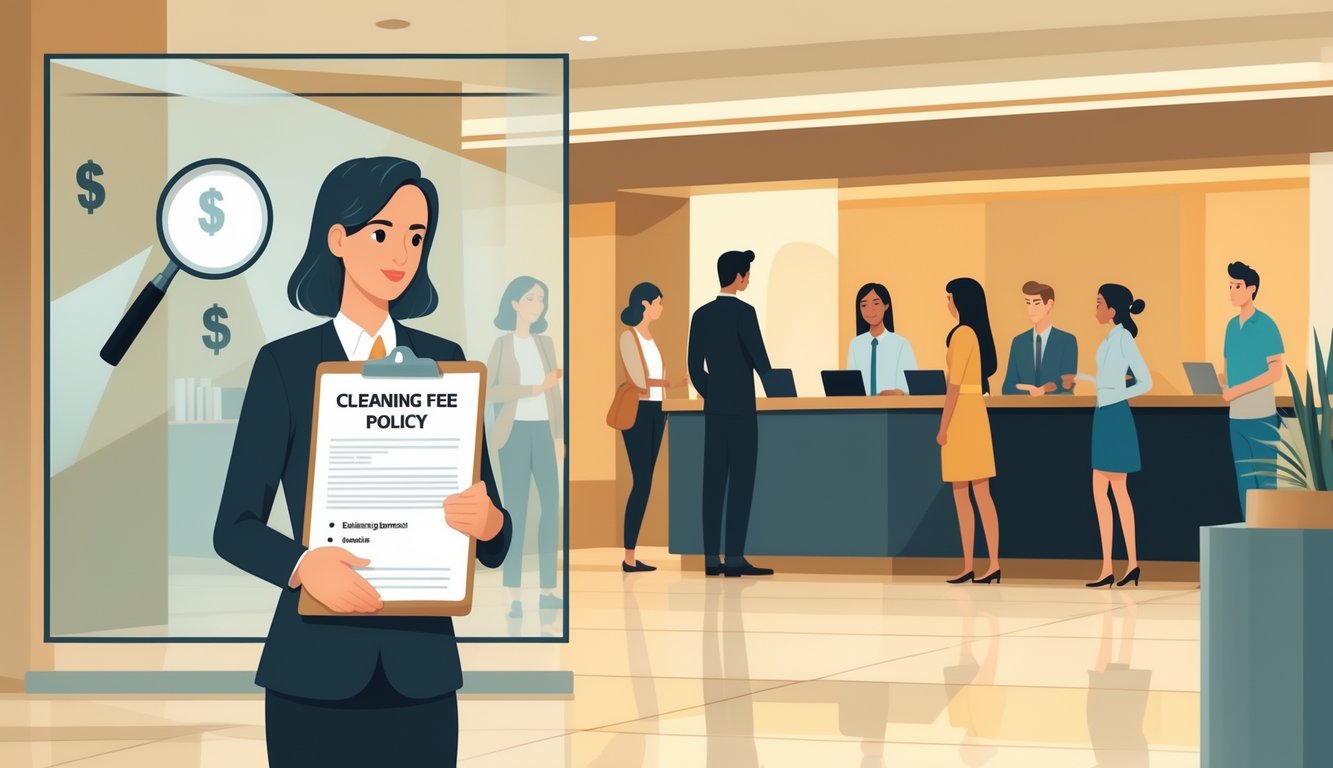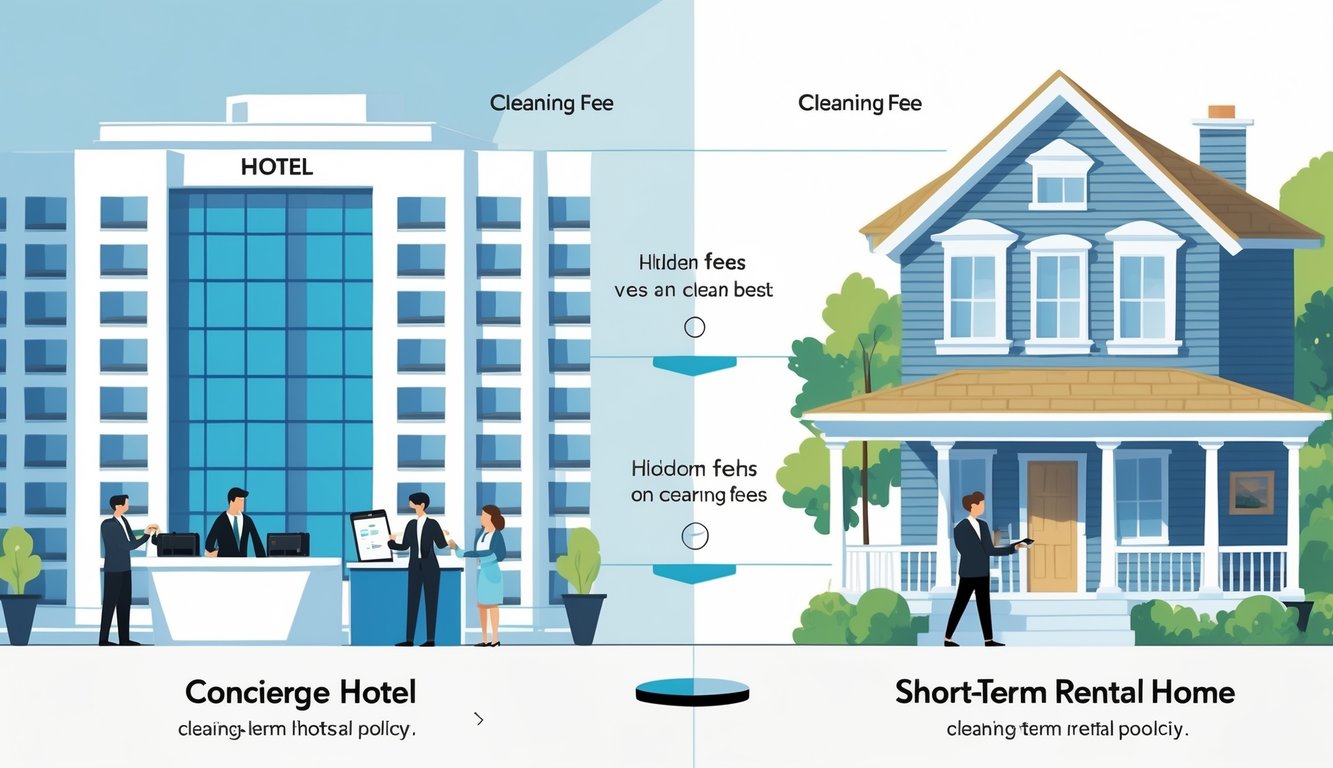
Comparison: Hotels vs. Short-Term Rentals

Cleaning fees are chaos. Nobody’s upfront about them, especially not the big chains. Transparency? Not even close. The difference between hotels and short-term rentals is all over the place—sometimes hotels hide it, sometimes Airbnbs slap it in your face. It’s like a contest to see who can make cleaning fees more confusing.
Hotel Cleaning Fees vs. Airbnb
Ever notice hotels dodge the “cleaning fee” label? I’ve never seen it on a bill. It’s always buried in “facility” or “resort” fees, probably mixed up with the cost of pool towels or soaps I never touch. The American Hotel & Lodging Association claimed in 2023 that only 6% of hotels charge extra for cleaning, but dig into the fine print and you’re paying for messes you didn’t even make. Chain hotels just bake costs in, rarely itemize anything, and never tell you what you’re actually paying for. Even the fancy places quietly bump up rates after COVID, then hide the details until checkout.
Airbnb? They practically brag about cleaning fees—it’s right there before you book, usually as a flat rate per stay. In 2022, Airbnb forced everyone to show the full cost up front—cleaning, taxes, sometimes fees that are bigger than the nightly rate. Skift’s industry analysis breaks it down, but I’m still not convinced a two-night stay in a tiny studio needs a $150 cleaning fee. “Host discretion” is the excuse now, which is just code for “we charge what we want.”
Vacation Rentals and Cleaning Charges
Vacation rentals or VRBO? Even messier. Hosts moonlight as cleaning companies, passing every penny to guests. My last VRBO tried to sneak in a “professional sanitation” fee for a cottage that was still sticky from the last group. VRBO just says, “hosts set the fees.” The reason? Local market rates, unpredictable guests, and some weird expectation that you leave the place spotless—like it’s an audition for a cleaning competition.
Analysts say U.S. short-term rental cleaning fees average $100 now. Where does the money go? Sometimes to a cleaning service, sometimes to the host’s cousin with a mop. No one checks. Rental sites pretend to help by showing “total price” up front—Airbnb, VRBO, all of them—but it’s just a new way to distract you until you see the total at checkout. “Transparent pricing”? Please. And don’t get me started on “linen fees”—since when did sheets become a luxury?
Government Scrutiny and Regulatory Action

Someone’s always grumbling about surprise cleaning fees—maybe it was me, maybe the last person in line at check-in. But honestly, it’s not even a surprise anymore. Regulators have noticed. They’re slow, but they’re poking around, and suddenly, even the weirdest hotel fees are getting attention.
Role of the Federal Trade Commission
The FTC—yeah, the U.S. Federal Trade Commission—keeps sending out press releases about “mandatory charges.” I never read them, but I catch a headline or two. A Harvard professor just called these fees “drip pricing”—all the stuff you don’t see until you’re already committed. I watched an FTC attorney admit on a livestream (while I ate cold leftovers, real glamorous), “If consumers can’t avoid these fees, that’s a problem.” Does anything change? Usually it’s just a stern letter and maybe a small fine, unless the penalty actually hurts the hotel’s bottom line. Overheard a hotel manager in Atlanta once: “It’s just paperwork, unless they start naming names.” Not sure he’s wrong.
The Junk Fees Rule Initiative
So, the “Junk Fees Rule”—honestly, who comes up with these names? It’s like my cable bill, concert tickets, and that $24.95 “resort amenities” nonsense all went to group therapy and decided to haunt me together. Apparently, the Biden administration wants to make this a crusade against hidden hotel charges (see this link if you like regulatory drama), but I’m skeptical. They’re pitching it as a huge win for consumers, but, uh, when has a rule ever made checkout less confusing? The proposed text says hotels have to show cleaning fees and other add-ons upfront—supposedly. Yet, every hotel manager I’ve ever chatted with? They’re already brainstorming loopholes. It’s almost funny: people complain after the fact, post-trip, Monday-morning rage, and by then, the whole mess has already been passed around three committees and a lobbyist’s inbox. So, yeah. Good luck.
Impact of Cleaning Fees on Hotel Rates

Don’t you love how fees just…multiply? You think you know the price, blink, and suddenly it’s unrecognizable. Comparing hotels is like rummaging through a thrift store where half the price tags are written in invisible ink. Is it supposed to be like this? Maybe that’s the point.
Total Cost of Stay
I’ve checked three brands, same city, same night—totally different totals. Every site is screaming about “rooms from $159!” and then, oh look, a “mandatory cleaning fee” buried in the fine print. Marriott downtown? Waited until the payment page to slap me with a $45 nightly cleaning fee. Felt like a prank—like pouring a bowl of cereal and finding gravel at the bottom.
Hotels claim it’s about “hygiene standards,” but let’s be real: these fees, sometimes disguised as resort or utility surcharges, can bump your bill by 10–25%, easy. Cornell did a study last year—mid-tier hotels, $26 a night on average for add-ons, not even during busy season.
My friends who travel for work? They literally compare receipts to see who got fleeced worse. Nobody pays the same. Add up cleaning fees for a week and you’ve got a whole extra budget category. It’s not “optional” unless you plan on sleeping in your car. (And, uh, try explaining that to your boss.)



